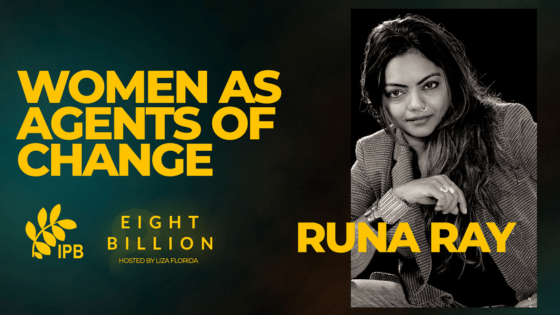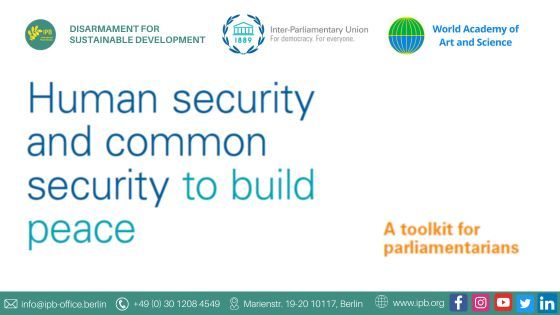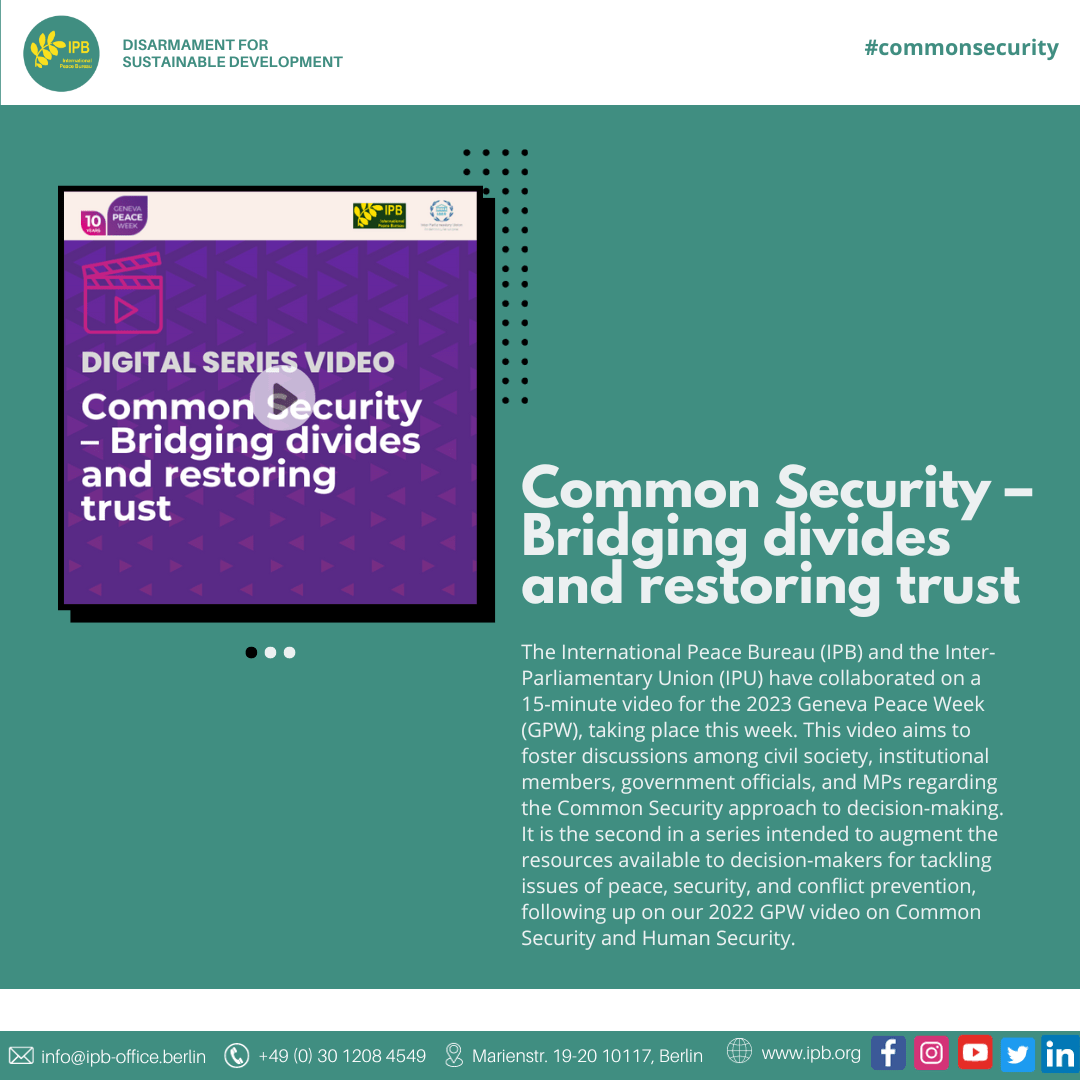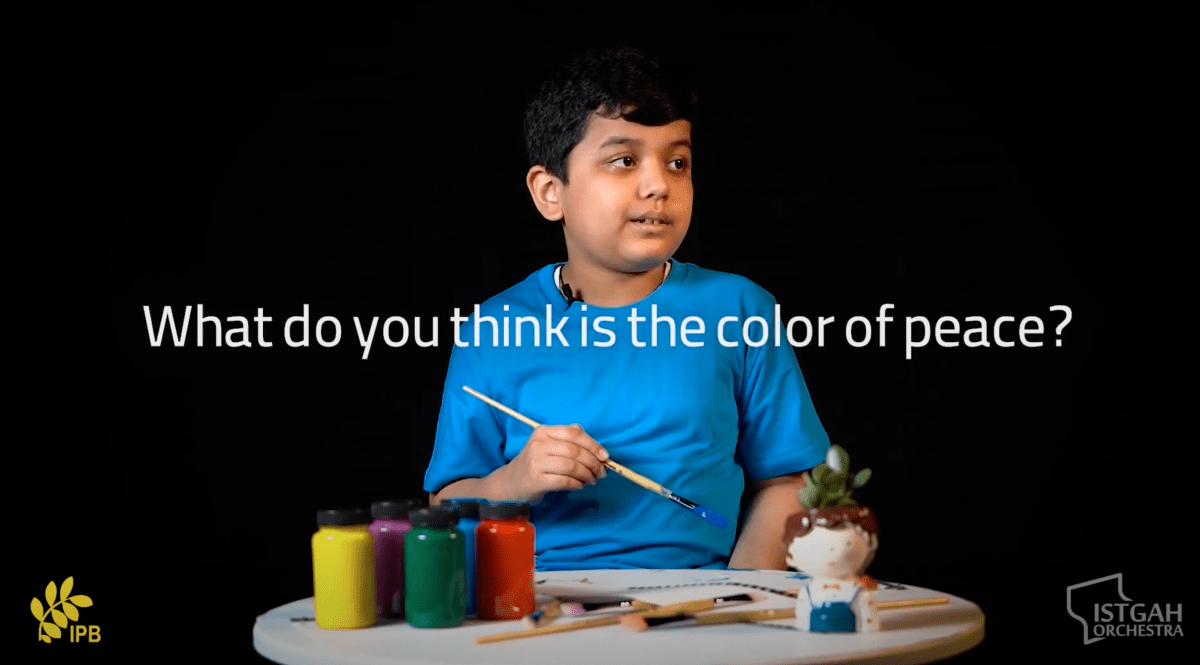In honor of International Women’s Day for Peace and Disarmament, we are proud to announce the launch of our brand-new podcast episode trailer — Women As Agents of Change Around the World — brought to you by the Eight Billion Podcast in collaboration with the International Peace Bureau.
Continue reading “Women as Agents of Change Series”Multimedia
NEW PUBLICATION: Human Security and Common Security to Build Peace – A Toolkit for Parliamentarians
A new joint publication by the Inter-Parliamentary Union (IPU), the International Peace Bureau (IPB) and the World Academy of Art and Science (WAAS) is designed to provide parliamentarians around the world with a toolkit for prioritizing human security and common security as opposed to militarized state security.
Continue reading “NEW PUBLICATION: Human Security and Common Security to Build Peace – A Toolkit for Parliamentarians”Common Security – Bridging divides and restoring trust
[Original post dated 31st October 2023]
The International Peace Bureau (IPB) and the Inter-Parliamentary Union (IPU) are thrilled to announce their collaboration on a special 15-minute video for the 2023 Geneva Peace Week (GPW), unfolding this week. This video, themed “Common Security: Bridging Divides and Restoring Trust,” aspires to unite civil society, institutional members, government officials, MPs, and all peace advocates. The focus is on the applicability of the Common Security approach in decision-making for fostering peaceful societies.
This video marks the second part of a series aimed at fortifying the tools at the disposal of decision-makers, particularly parliamentarians, to effectively address peace, security, and conflict prevention. It follows our GPW 2022 video “Perspectives on global and local applications of Common Security and Human Security”.
About the Video
Offering a thorough exploration of the Common Security concept, the video delves into its historical, philosophical, and political underpinnings, spotlighting its practical applications. Interviews with experts, parliamentarians, and seasoned peace practitioners clarify how Common Security principles tackle today’s global challenges, particularly in regions marred by conflict or tension.
The video is structured into two segments: “What Makes it Successful” and “Potential Stumbling Blocks.” The first section accentuates the positive aspects and success factors of Common Security in rebuilding trust. Conversely, the second section presents a balanced perspective by recognizing potential obstacles in peace processes rooted in Common Security, underscoring the need for humility, compromise, and checks and balances.
Case studies showcasing successful Common Security applications further illustrate its capacity to foster trust among nations and build lasting peace agreements. The video ultimately seeks to encourage an informed dialogue among policymakers, scholars, and the public, emphasizing citizen outreach as key to the approach’s sustainability.
Featured Speakers:
- Mr. Martin Chungong, Secretary General of the Inter-Parliamentary Union;
- H.E. Dr. Ali Rashid Al Nuaimi, Member of the Federal National Council of the UAE, President of the IPU Task Force for the peaceful resolution of the war in Ukraine;
- Mr. Daniel Carden, MP of the United Kingdom, President of the IPU’s Forum of Young Parliamentarians;
- Ms. Dr. Anuradha Chenoy, Adjunct Professor at Jindal Global University, Member of the IPB Common Security working group;
- Mr. Reiner Braun, historian and peace activist, former Executive Director of IPB;
- Ms. Anna Sundström, Secretary General of the Olof Palme International Center;
- Ms. A-Young Moon, Founder of PEACEMOMO, Council Member of IPB.
We extend our deepest gratitude to our incredible speakers and our esteemed colleagues from the Inter-Parliamentary Union (IPU). We invite you to watch, reflect, and engage with the ideas presented in the video. Good vision!
Colors of Peace – Istgah Orchestra & IPB
Have you ever had a fight or conflict with anyone? Did you reconcile after the fight? What do you think is the color or war? What do you think is the color of peace? Eight children from different international backgrounds give their answers to these simple but profound questions.
In collaboration with the International Peace Bureau, the Istgah Musical Orchestra presents us with this beautiful piece of art, sending to all the world an important and necessary message of peace. May the perspective of children guide our take on conflicts and on how to bring more color to our society.
Istgah Orchestra Manager: Mahdi Norouzi Executive Director: Kimia Bakhtiarian International Affairs: Nazanin Adhami Coordinator: Mahdis Yaghoubnezhad Costume & Set Design: Yasamin Hariri Photographer: Melika Naeiji Question Developer: Golfam Goudarzi (Child Psychologist) Director & Editor: Soroush Q mar C Videographer: Amin Nakhi
More info: https://istgahmusical.com/en/
Video: Jeremy Corbyn receives the MacBride Peace Prize
Sean MacBride Peace Prize Ceremony: Jeremy Corbyn received the award in Geneva on December 8th 2017.
Jeremy Corbyn on nuclear weapons, disarmament and security issues
Tony de Brum | Speech at the MacBride Prize Ceremony 2014
Tony de Brum received the Sean MacBride Peace Prize in 2014 on behalf of The people and government of the Republic of the Marshall Islands.
Listen to the wonderful speech he gave.
IPB Video of the Office in Geneva
The IPB’s office at the Rue de Zürich in Geneva closed on June 30th. We first moved there in 1964! Check out the video – a tour through the office. Many of you will remember.
The Coordinating office is now in Berlin and the Global Campaign on Military Spending is run from Barcelona.
IPB will maintain a presence in Geneva.
Interview with Fabian Hamilton
Dave Webb (IPB Vise President) interviews Fabian Hamilton (Shadow Minister for Peace and Disarmament) at the UN.
March 28th 2017, New York
Ways out of the new Cold War
The International Peace Bureau presents a short video entitled “Ways out of the new Cold War”, put together by the Secretariat youth team. It combines the views of experts and IPB activists.





